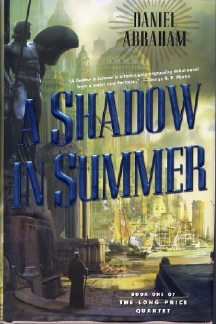It’s a thrill when a new, really good fantasy writer comes along,
someone comfortable with the old tropes and willing to explore them with
new ideas. Daniel Abraham is off to a good start with 'A Shadow in Summer',
a fantasy rich with politics and a new, strange sort of magic that partakes
in equal measure of the mercantile and the poetic. The driving force
for many of the characters is a love of country or city, a love of home;
for others, it is a love of the ethical, the true, the moral; for some,
it is both. This first book of a quartet – “The Long Price
Quartet” – is quite promising.
'A Shadow in Summer' has obviously been influenced by The New Weird, even if
it is not part of it. The city of Machi is its own character, a vaguely Asian
trading
center where cotton rules because of the presence of the andat Seedless, a creature
that can cause cotton seeds to drop from the boles without human intervention.
Seedless is a living poem, created by a high caste of humans who can hold visions
created of and composed of words and ideas, and sometimes even create them with
the perfect words in the perfect order. In this world, poets are among the most
honored and rewarded of humans because of their ability to bring forth the andat.
Whether the andat appreciate being used, however, is another question: they don’t.
They incessantly attempt to escape, and as years go by, they are sooner or later
successful. As a result, it is harder and harder for a poet to find a new andat
that is of any commercial use, and no one has any interest in an andat that can’t
be used for profit. Seedless is one of the last who has value – for once
an andat is called, it is very difficult, often impossible, to catch it again.
An andat comes from blissful nothingness into a simulacrum of life, devoted to
easy service but experienced as unpleasant servitude. A poet, on the other hand,
comes from a childhood of unceasing, brutal labor and discipline – called “training,” of
course – into a life of honor, dignity and riches. The dynamic between
the poet and the andat, therefore, is that of one who has escaped slavery and
now owns a slave of his own.
The characterization in 'A Shadow in Summer' is particularly well-drawn. Otah
is a student of poetry for whom the brutality proves to be too much, despite
his
remarkable talent. Maati is the poet for whom Otah once did a kindness that was
not a kindness, a man both weak and strong, who longs for the honor of holding
an andat within his power but recognizes, too, the wrong of it. Seedless
itself is sly, sad, smart. Amat is a canny woman who longs for mercantile power,
who
has the brains of a capitalist and the scheming of a tycoon.
But it is the plotting that makes this book especially fascinating. There is
so much scheming, so many plots within plots, that the reader must pay close
attention in order to understand the complexities of this well-imagined society.
The book holds the best of mystery even as it partakes entirely of modern, urban
fantasy.
Best of all, 'A Shadow in Summer' tells an entire story in the first book of
a
series of four. The reader isn’t left hanging on a cliff edge, hoping that
the next book comes along before interest falls off. To the contrary, this book
whets one’s appetite for more because of the very skill of it, that is,
because of Abraham’s ability to tell a single, unified story while still
leaving plenty of room for further development. I’m looking forward to
'Winter’s Cities', the second book of The Long Price Quartet, because this
author has what it takes to tell a story, the same way I look forward to the
next Swainston or Mieville. I hope we’ll be hearing a lot more from Abraham.
